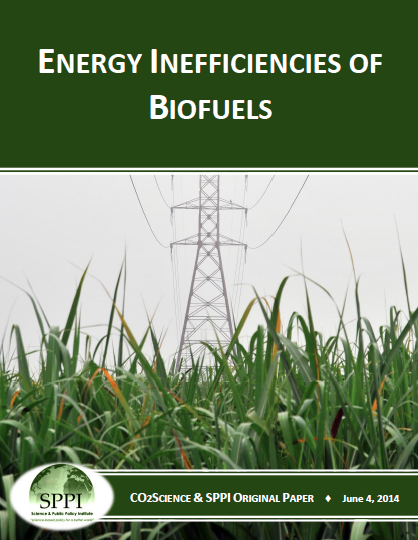News / Science & Technology
Energy Inefficiences of Biofuels

How efficient is it to produce energy from biofuels-is it more, less, or about the same as from traditional fossil fuels? This mini review summarizes what several scientists have learned when investigating this topic.
Gomiero et al. (2010) reviewed the wisdom of proposed appropriation of much of the planet's land and water resources for the purpose of supporting large-scale production of biofuels as replacements for fossil fuels. And in doing so, they came to a number of unfavorable conclusions about the highlytouted enterprise. For starters, they report there is not enough readily available land to produce much fuel from biomass without causing a severe impact on global food commodities, while adding "even allocating the entire USA cropland and grassland to biofuels production, the energy supply will account for only a few percentage points of the USA energy consumption," which suggests "there is no hope for biomass covering an important share of USA energy demand." Noting "the same is true for the European Union," the researchers go on to say "biofuel production cannot, in any significant degree, improve the energy security of developed countries," for to do so "would require so vast an allocation of land that it would be impossible for a multitude of reasons."
Another problem, in the words of Gomiero et al., is that biofuel production, including cellulosic ethanol from crop residues and grasslands, "does not appear to be energetically very efficient." In fact, they indicate fierce debates have arisen, over whether the energy output/input ratio of various biofuel production enterprises is 0.2 of a unit above or below 1.0, which seems pretty ridiculous in light of another item they report, i.e., the fact that "our industrial society is fueled by fossil fuels that have an output/input ratio 15-20 times higher." Indeed, they write recent assessments of the subject demonstrate that extensive biofuels production may actually tend to "exacerbate greenhouse gas emissions and in turn global warming." And they state biofuels "may greatly accelerate" the destruction of natural ecosystems and their biodiversity by "the appropriation of far too large a fraction of net primary production," thus resulting in a threat to their "health, soil fertility, and those key services needed by human society."
In concluding, Gomiero et al. warn "biofuels cannot be either our energy panacea, nor supply even a minimal share of energy supply for our society without causing major social and environmental problems." Therefore, they suggest we use our "hard earned money," as they put it, to "help farmers, both in developed and developing countries, to adopt energy savingenvironmentally friendly agricultural practices, that can really help to cut greenhouse gas emissions, prevent soil erosion, reduce water consumption, relieve the environment from toxic pollutants, preserve wild and domesticated biodiversity and supply many other services," which is precisely what elevated concentrations of atmospheric CO2 tend to promote (Idso and Idso, 2011; Idso et al., 2014). In a final statement, the three scientists advise in their concluding sentence: "We should be careful not to let our 'energetic despair' (or vested interest) lead us to worsen the very same environmental and social problems we wish and need to solve."
Read More Here
